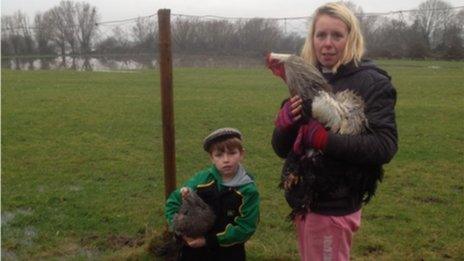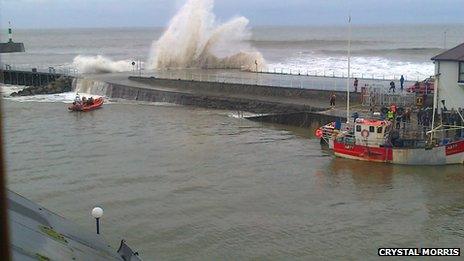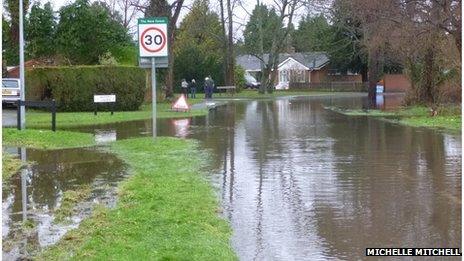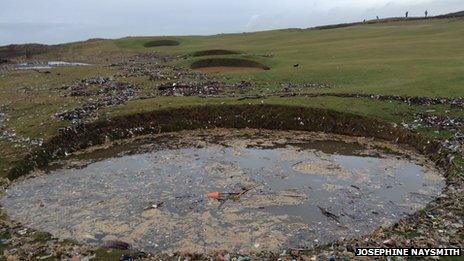UK storms: Communities face more disruption
- Published
The BBC's Olivia Richwald: "Aberystwyth will need to have a major clean-up"
Further stormy weather is expected across many parts of the UK as coastal communities already hit by flooding begin to assess the damage.
Four earlier severe flood warnings, external for England have been lifted but a storm surge is expected on the Forth later.
Commons environment committee chairwoman Anne McIntosh described the flooding as a "major event".
Meanwhile a search is continuing for Harry Martin, 18, last seen approaching a Devon coast path on Thursday.
It is believed he had been going to take weather-related photos near his home in Membland, Newton Ferrers.
About 120 local people have joined professional search and rescue teams to look for the teenager.
Ms McIntosh said her committee had looked at a recommendation to move electricity substations to higher ground, and added that "a couple" had been caught in the current flooding.
She also said that more frequent rehearsals were needed between flood events, and urged people to heed government warnings to stay away from sea fronts and rivers.
On Friday, hundreds of homes were flooded, and residents were evacuated in Dorset and Aberystwyth.
Earlier, the Environment Agency had issued a severe flood warning - meaning "danger to life" - for Westbury, Broadoak and Newnham on the Severn Estuary in Gloucestershire.
Severe flood warnings had also been in place on the tidal Severn from Elmore to Rodley due to strong winds which could cause defences to be overtopped, and at Minsterworth and Quedgeley.
In Dorset, a severe flood warning had been issued for Iford Bridge Home Park in Bournemouth
Simon Clemison reports from Portland in Dorset, where a severe flood warning was lifted early on Saturday morning
In Scotland, where a number of flood alerts and warnings are in place, local authorities and the environment agency Sepa have warned of a possible large storm surge on the Forth on Saturday afternoon.
The greatest danger will be at about 16:00 GMT with low-lying areas affected around the Firth of Forth, and inland at the River Esk in Musselburgh.

Six-year-old Toby Sadler and his mother Bryony had to move their chickens from approaching waters on their farm on the Somerset Levels

Aberystwyth seafront was hit by more stormy weather on Saturday morning

Flooding affected the Hightown area of Ringwood in the New Forest

Bunkers filled up at Royal Porthcawl Golf Club in south Wales
In other developments:
A man was rescued by police in Newquay after going into the sea in the early hours of Saturday morning
The Thames Barrier will close at 17:00 GMT because of "ongoing high flow/high tide conditions", according to the Environment Agency.
Roads remain closed because of flooding in parts of the UK including south-west England, Cumbria, southern Wales, Northern Ireland and western Scotland
On Sunday, more wet and windy weather is predicted for the western side of the British Isles, gradually sweeping its way north and eastwards
The Environment Agency, which has issued about 100 flood warnings, external across England and Wales, warned the risk of flooding would continue throughout the weekend
Part of a cliff has collapsed into the sea on the East Sussex coast after being undermined by rough seas

Harry Martin from Devon was last seen on Thursday
The Environment Agency's John Curtin urged people to check the flood risk in their area via its website, external and Twitter, external.
"We would again remind people to avoid coastal paths and promenades which could be dangerous," he said.
On Friday, a tidal surge caused flooding in western and southern Scotland.
Residents in Chiswell and Portland in Dorset were evacuated ahead of high tide on Friday night.
In mid-Wales, about 100 people took shelter for high tide at a school in Aberystwyth and a community centre eight miles (13km) away in Borth, where waves peaked at up to 6ft (1.8m).
Rebecca Davies, pro vice-chancellor of Aberystwyth University, said about 120 students had been evacuated from seafront residences in the town.
She said waves had "pretty much washed away" big sections of the promenade.
"Our accommodation is basically now acting almost as the sea wall," she said.
"They were all the houses which were on the seafront."
Arriva Trains Wales said flooding was still causing significant disruption, external.
National Rail said some routes in England, Scotland and Wales would continue to be affected by problems caused by previous storms.
It said Arriva Trains Wales, external, First Great Western, external, Island Line, external, Northern Rail, external, South West Trains, external and Southern, external train services were affected.
Sir John Beddington, former government chief scientific adviser, told BBC Radio 4's Today programme that the UK was experiencing "an increasing frequency of extreme weather events", such as droughts and flooding, which is related to climate change.
Aidan Kerr, of the Association of British Insurers, told the programme that it was too early to estimate the total insurance cost of the flooding.
He said a single event was unlikely to affect insurance premiums in future.
- Published4 January 2014
- Published4 January 2014
- Published4 January 2014
- Published4 January 2014
- Attribution
- Published5 January 2014
- Published4 January 2014
- Published18 February 2014
- Published3 January 2014